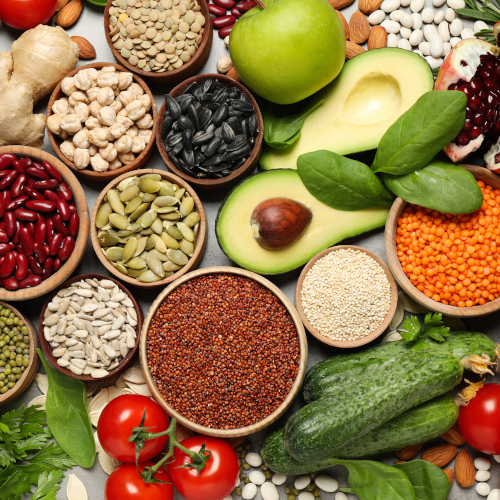Satvic foods are believed to enhance vitality, improve digestion, and support mental and emotional well-being. They are considered the ideal diet for maintaining balance and harmony within the body and mind.
Satvic Food
Fruits and Vegetables:
Fresh, organic, and seasonal produce.
Whole Grains:
Brown rice, quinoa, barley, and oats.
Nuts and Seeds:
Almonds, walnuts, chia seeds, and flaxseeds.
Dairy:
Fresh milk, ghee, and yogurt (preferably from cows).
Herbs and Spices:
Basil, turmeric, and ginger.

Rajasic Food
Spicy and Stimulating Foods:
Chili, pepper, and garlic.
Caffeinated Beverages:
Coffee, tea, and energy drinks.
Fried and Oily Foods:
Deep-fried snacks and heavily processed foods.
Sugary Treats:
Sweets, chocolates, and desserts.
Rich and Heavy Foods:
Overly spiced or salted dishes.

Tamasic Food
Processed and Preserved Foods:
Canned, frozen, and packaged foods.
Heavy and Stale Foods:
Leftovers and overcooked meals.
Meat and Alcohol:
Red meat, poultry, fish, and alcoholic beverages.
Fermented and Overripe Foods:
Vinegar, pickles, and overripe fruits.
Stimulants:
Excessive caffeine, and tobacco.

Meal Timing and Frequency
Regular Meal Times:
Eating at consistent times each day.
Mindful Eating:
Eating slowly and savoring each bite.
Light Dinner:
Having a lighter meal in the evening.
Avoiding Late Night Eating:
Not eating close to bedtime.
Fasting:
Occasional fasting to detoxify and rejuvenate.
Food Preparation and Cooking
Fresh Ingredients:
Using fresh, high-quality ingredients.
Minimal Cooking:
Preserving nutrients through light cooking methods.
Positive Environment:
Cooking in a clean, calm, and positive environment.
Mindful Cooking:
Preparing food with love and mindfulness.
Avoiding Over-Processing:
Minimizing the use of heavy spices and excessive oils.
Hydration
Adequate Water Intake:
Drinking sufficient water throughout the day.
Herbal Teas:
Consuming herbal teas like tulsi, chamomile, and peppermint.
Avoiding Cold Drinks:
Preferring room temperature or warm beverages.
Hydrating Foods:
Including water-rich fruits and vegetables in the diet.
Limiting Sugary Beverages:
Avoiding sodas and sugary drinks.
Ethical and Environmental Considerations
Vegetarianism/Veganism:
Choosing plant-based diets for ethical reasons.
Sustainable Sourcing:
Selecting locally grown and organic foods.
Reducing Waste:
Minimizing food waste and using leftovers creatively.
Eco-Friendly Practices:
Using reusable containers and avoiding plastic.
Mindful Consumption:
Being aware of the impact of food choices on the environment.
